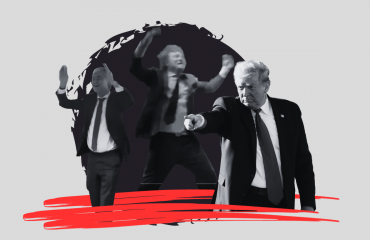

Let’s be realistic. The Turkey-U.S. relations can not go the way they used to do after so much damage. Going back is out of question. It is not just because U.S. President Joe Biden named the 1915 killings of Armenians “genocide”. It is not just because that the issue came forward because the Biden administration loves Armenians and also wanted to teach Turkey a lesson through President Tayyip Erdoğan. And it is not just because Erdoğan, who sees the U.S. behind the July 15, 2016, coup attempt, teach Washington a lesson by acquiring S-400 missiles from NATO-adversary Russia. It is not also just because the U.S. recognizes that it is losing the “gendarmerie of the world” status despite all the military and economic power it holds and wants to prove itself by putting pressure on Turkey, a country that should actually be one of its most important allies against Russia. The reasons are not limited to these above.
As the principle of common interests between Turkey and the U.S has been damaged, the half-a-century-long trust has also disappeared.
Turkey’s relations with the West under the leadership of the U.S., which improved after World War II, have come to a real decisive corner.
Erdoğan’s reponse was not that hard, but…
Erdoğan responded to Biden’s recognition of the “Armenian genocide” two days later on April 26. He denied the allegations of genocide, saying that mutual massacres could not be stamped out as genocide. He asked Biden how could he change important NATO allies like Turkey to the Armenian lobby, having no link with NATO. Erdoğan asked Biden to “correct his mistake”, knowing that it wouldn’t happen.
When it comes to Turkey-US ties Erdoğan said the following:
• “No matter what the circumstances we will walk towards our own goals. We are tired now of being asked to step back. Providing that they will be on equal and just grounds, Turkey sincerely wants to work together and walk the path together with the US and the EU.
• “If our stance is respected, we are ready to talk, negotiate, agree, and cooperate with everybody on every ground. I believe that we will open the doors of a new era by evaluating these issues face to face at the meeting we decided with US President Biden (during the NATO summit) in June.
• “We need to put aside the issues that poison the relations of the two countries and look at how we will take steps towards the future. Otherwise, we will have no choice but to implement the practices of the new level that our relations fell on April 24th.”
In summary, Erdoğan responded to Biden with a rather lower profile than could be expected from him. Almost as if confirming the endurance “test” comments in the American media… In doing so, he said that he would ask for a re-definition of relations with Biden in June. Or will there be no other choice but to implement new “practices”? What are those practices? There are no details yet.
İncirlik military base and the Halkbank case
Whenever Turkey-U.S. relations go sideways, those who think about these issues, including me, remember the İncirlik military base in Turkey. Süleyman Demirel, the late president who was the prime minister at the time. had closed in 1975 the İncirlik base, a NATO facility by then, to the U.S. use in reactions to the arms embargo by Washington. It would be naive to think that this example that comes to our mind is not taken into account by the U.S. administrations. On the other hand, it would be shallow to tie the belated and rather milder than could be expected response of President Erdoğan to the Halkbank case, which will resume in early May, and Reza Zerrab, the Iranian-origin businessmen will testify as a confessor witness in the trial over violation of sanctions on Tehran through the Turkish state-lender.
And I insist on this, although keeping in mind what a U.S. official told me when talks between Turkey and the U.S. over Syria were held in 2019: “We also do have financial nuclear bombs and we reminded it to your side.” Likewise, I am saying this without ignoring that the United States is still hosting Fethullah Gülen, who was involved in the 2016 coup attempt, and his network. These two factors affect relations more deeply than the U.S. cooperation with the PYD/YPG, the Syrian arm of the outlawed PKK. The U.S. cooperation with the PKK is rather conjectural despite the possible hopes of the latter. The U.S.’ real need for the PKK seems to be against Iran across the Iraqi border in line with Israel’s needs.
Who benefits this landscape?
Although Erdoğan and Donald Trump faked a friendship picture of improving ties (despite counterexamples of Turkey’s purchase of S-400 missiles, its exclusion from the F-35 fighter jet program, Trump’s tweet threatening the Turkish economy during the foreign exchange crisis and his letter telling Erdoğan “Don’t be a fool,” ) the problems were swept under the carpet emerged with the start of the Biden administration.
Biden responded to a congratulation call by Erdoğan six months later, and only to tell him that he would recognize the Armenian “great disaster” one day after. According to the U.S. think tank Washington Institute’s Soner Çağaptay, Biden recognized “for the first time in many years [that] Erdoğan needs the U.S. more than Washington needs him.” The comments of “Biden is testing Erdoğan” in the U.S. media also indicate that. It would be incorrect to interpret Erdoğan’s acceptance of a meeting with Biden in June at the NATO summit as an indication of a necessity due to the Halkbank case. It would also not be right to interpret Presidential Spokesperson İbrahim Kalın’s remarks that “We will give our answer in upcoming weeks and months” just as the Turkish government has nothing to do, it is just trying to borrow time.
So, should we expect new steps about Turkey’s NATO roles? Could these come in a shape similar to a walkway or partially freeze certain functions of the NATO’S military wing just like France did in 1966 due to nuclear armament or Greece did in 1974 due to the Cyprus issue?
IErdoğan may not take radical steps regarding NATO, at least until the Biden meeting in June. But after that everything could be on table. Ofcourse, the person who will be most pleased with these would probably be Russian President Vladimir Putin.
The issue is not limited to Erdoğan anymore
Russia would really enjoy the cracks in Turkey’s relations with the U.S. and NATO. And its ally, China, too. And Greece little. I say a little, because the gap between Turkey and NATO, would have its impact on the Greece and Cyprus issues soon.
Turkey-U.S. relations have basically developed after World War II. The Truman doctrine aimed at shutting the Russian access to the Mediterranean Sea through Turkey and Greece. Turkey participated in the Korean War in 1950 showing that it might blood for the sake of Western interests and showed the ability to fight, and was included in NATO along with Greece in 1952. The U.S. minded Turkey-Greece until now despite ups and downs. This did not change during the Trump era. However, it is seen now seen that this also deteriorated with the Biden administration and Biden openly supports the Greek-Greek Cypriot theses in the Eastern Mediterranean.
The Cyprus talks in Geneva under U.N. supervision will begin in this atmosphere. Greece and the Greek Cypriot governments are members of the EU. And Turkey will be on the agenda in the EU summit in June, the same month as the NATO summit where Erdoğan and Biden will meet. The U.S. and the EU are dedicated to act together in the Turkey issue.
We are really talking about a pile of problems all knotted together.
It is seen that the Turkey-U.S relations will not continue this way even if Erdoğan loses an election and a new government comes to power in Turkey. Since things will not be the same but ties with the U.S. cannot be broken, Turkey needs a new roadmap. It seems that there is an even more painful process ahead of us.


